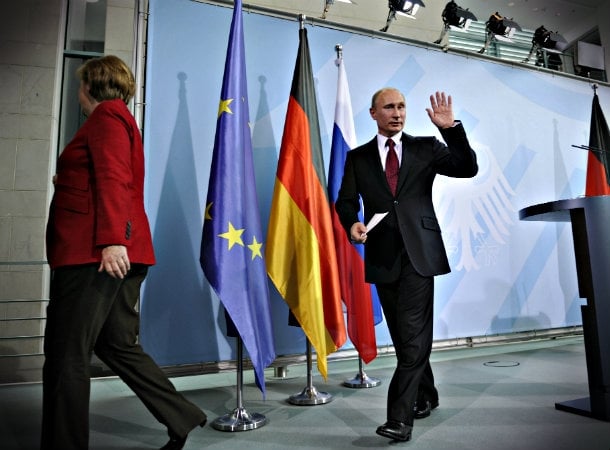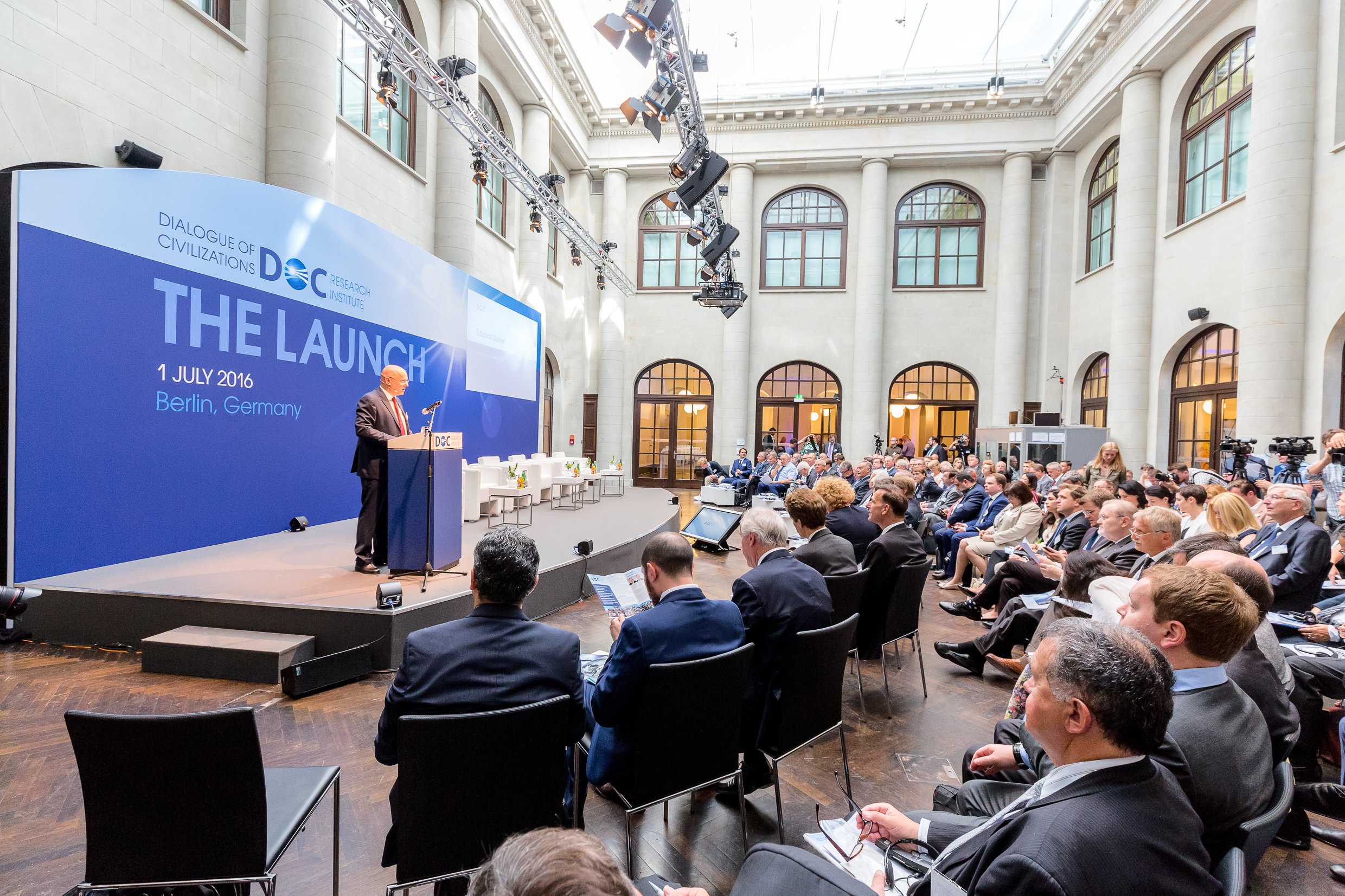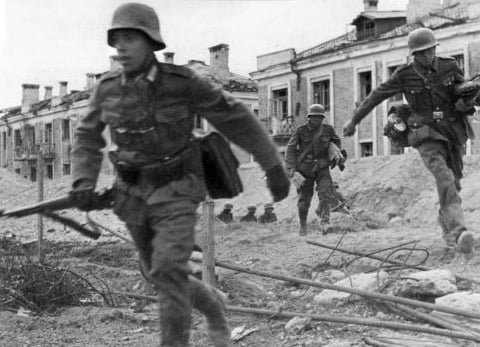The latest in the perilous liaisons between pro-Russian Germans and Vladimir Putin is taking the propaganda war on the West to a whole new level with a think tank relocated to Berlin, Karl Schlögel wrote for Die Welt.

It was only a matter of time before the grand Russian performance arrived in Germany. And it did, at the Berlin Bühne theater last Friday. It was the official opening of the “Dialogue of Civilizations Research Institute” in Berlin.
Moscow has always seen the longstanding Russian House in the German capital, with its gigantic entrance hall and small display cases, as a sarcophagus of late socialism — not nearly enough to satisfy Putin’s ambitions of “a Russian world.”
Instead, the grand opening of the Institute at the Humboldt Carré and a representative branch in central Berlin are aimed at the heart of a city in which decisions of European importance are made.
Until recently you would not have been able to imagine that, at the end of the long and difficult decades-long process of de-escalation between Russians and Germans, the reins could be handed over to a former KGB general, who is a member of “Putin’s kleptocracy” (in Amercian academoc Karen Dawisha’s words, taken from her brilliant research). Intelligence services, orthodoxy and oligarchy —all rolled into one person.
Your astonishment at these developments, however, only demonstrates that you have not been keeping up with Putin and his think tank, whose policy is one of escalation in both military and ideological terms. They certainly know with whom they are dealing, namely with a Germany that has become tired after all the turbulence and crises of the last few years — Greece, Europe, war in the Ukraine, Brexit — and just wants to be left in peace and resume business-as-usual.
You do not need to be an advocate of conspiracy theories to know that the relocation of the think tank from Vienna to Berlin was carried out with precision timing. Russia’s rich men, who stigmatize and persecute independent newspapers editorial, journalists and all sorts of initiatives, have had the audacity to take the war for “cultural hegemony” to foreign soil.
There is no lack of money seeing as the oligarchs made sure to transfer their holdings overseas. And they learned that everyone and everything, from the Nord Stream pipeline to Kensington real estate, is for sale. Sometimes it is even given to you for free.
Their success in Germany is nearly a given due to the fact that this country is the home of a singular “culture of discourse.” In Germany, the belief to continue to try and solve the world’s problems with people who have long since left the negotiating table, is irrefutable.
Putin fans, Russian standards
The institute’s choice of personnel is telling: a former head of the most notable German political trust to promote social democracy; a qualified university lecturer from Rostov-on-Don, Russia; a “talk show general” (who can’t even read maps); diplomats who cannot keep their temper under control and want to take advantage of their nobility to take their place in the historic relations between Germany and Russia.

They are all clearly Putin fans, who are more in love with Putin rather than Russia, who loftily “reassure” Russia that “it is not ready yet” and that “no Western standards” should be applied. In short: They claim that Russia is too backwards to be able to tolerate democracy. The West’s age old arrogance hidden behind the façade of russophilia.
There were of course good reasons to have moved the institute from Vienna to Berlin. Vienna is too remote and Austria already has plenty of Putin sympathizers. But most of all, Berlin is seen to be, strategically speaking, more important. It seems that Berlin is the place where they could, with very little effort on their part, make the breakthrough needed to see the West and EU crumble once and for all.
Putin’s think tanks have read the signs in the West. Coalitions that no one would have thought possible four years ago have become reality. A political left wing that invokes Liebknecht and Luxembourg but does not mind supporting the warlords in Donbass or Russian bombs hitting Aleppo. The right-wing German movement Pegida displaying posters stating “Putin, save us!” and welcoming the Russian President’s black Nightwolf Motorcycle Club. And last but not least an incalculably wide field of those victimized and offended now eager to take revenge, revenge on the West and, most of all, on the Americans. For them all: Putin, the avenger is there.
And then you have the surrounding Russian community of more than 200,000 people and several Russian-speaking newspapers. We don’t even have to mention the appointed Putin fans who remind us of their presence with hate mail sent to critics on a daily basis.
Putin’s friends, such as Gerhard Schröder, Gabriele Krone-Schmalz and Edmund Stoiber, would have us believe that criticizing Putin proves a renaissance of Russo-xenophobia, racism and the subhuman ideology. I have been traveling Russia, this wonderful and large country, for too long to be intimidated by this.
Russia’s being a part of Europe means having Putin fans all around you. As if we didn’t know. They always assault us by mentioning Russia’s outstanding culture, Dostoyevsky, Tolstoy and Pasternak. And they always imply that to attack Putin is to attack Russia. They would have us believe that we “demonize” Putin and that, actually, it is always someone else’s fault. May it be the armed aggression against Ukraine or the exclusion and disqualification of doped athletes from international competitions, it is always someone else’s fault.
The Putin apologists claim sole monopoly of Russophilia, although they are probably mostly thinking about their male-bonding sessions, having shared a pint of beer and possibly scored a lucrative job posting. That is perfectly fine, they can do whatever they want to but not “in our name.”
Those who know a little about Russian culture also know what happened to the great men of literature Dostoyevsky, Tolstoy, Pasternak. There always has been a Russia of the lords and of those who did not want to be their slaves. The guilt felt by Germans towards the Russians (but not towards the other countries of the former Soviet Union). The gestures of a powerful nation, always preferring to cultivate “German-Russian” relations rather than those to other Eastern European countries. Sentimentality and kitsch and, last but not least, the feeling that we Germans want to be left alone. Despite the fact that a war is raging less than a two-hour flight from Berlin.

The normalization of German-Russian relations had advanced so well because generations of people demonstrated their good faith despite geographical borders that divided them. And they did so in Berlin, of all places. Russian Berlin, a place where, like nowhere else, you are able to see the German-Russian embroilment during the “century of extremes.” A place that has become a stage for a former KGB general who is supposed to lead the “Dialogue of Civilisations.” This is, for me personally, the biggest defeat I had to suffer in my life, scientifically as well as politically.
Berlin does not deserve to become the seat of a neo-imperial, anti-European Internationale after having been the prospective center of a world revolution between the wars, and, later on, Stalin’s Komintern, which is nowadays the sanctuary of a community of refugees that encompasses hundreds of thousands of people. Germany’s Social Democratic Party, located in Weimar and sister party to the Russian Social Democrats, who are in exile in Berlin, should take a close look at their own history. Only then, should they decide if they want to play this Russian card in the upcoming poker game of national elections.
Karl Schlögel, for Die Welt
*Karl Schlögel is a German historian whose work focuses on Russian modernism and Stalinism.





